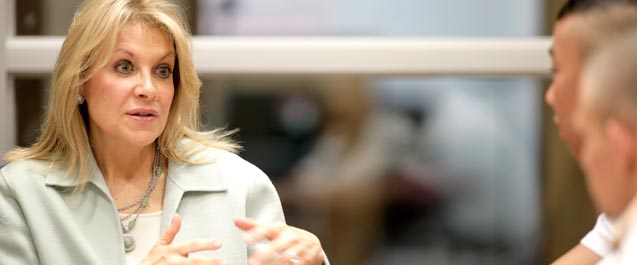More Than Money
Transylvania is a leading advocate for the liberal arts, so it makes sense the university would prepare its future grads for more than just a high-paying job to keep up with the Joneses.
The school’s career and mentoring programs provide skills and experiences that are not only desired by employers—increasing the likelihood of a nice paycheck—but also those that help the grads find personal fulfillment both on the job and off.

“In working with students as they select majors and investigate careers, we want to examine their values, skills, personalities and interests as well as learn more about the world of work,” said Mike Nichols, a psychology professor and career counselor.
Transylvania facilitates real-life career experiences that can show students pathways they didn’t even think possible and free them from self-imposed limitations such as: I’m an accounting major so I should be a CPA. (After all, the “liberal” in “liberal arts” is derived from the Latin word for free.)
Through programs such as the 100 Doors to Success mentoring initiative and internships (academic or otherwise) facilitated by the university’s Career Development office, students travel beyond the Transy bubble to learn about an array of career possibilities—often stepping outside their comfort zone. “It’s like Baskin Robbins: 31 flavors,” said Susan Rayer, director of career development. “Taste test. Go out and see what you like to do.”
It’s not likely Rayer will let this ice cream sit around long enough to melt. She is adamant that students in their first year of college start to think beyond graduation. “You always begin with that end result: a successful life after Transy,” she said. “The liberal arts are a foundation for a successful life.”

First-year students, who often don’t yet know what they want to do after they graduate, are required to meet with a Transy Career Development counselor and are encouraged to find a mentor through the 100 Doors program.
Spearheaded by President Seamus Carey, 100 Doors pairs students with alumni who have a wealth of life and work experience to share.
The extraordinary response to the new program surprised Director of Mentoring Programs Tracy Dunn ’90. When the pilot program started last spring, hopes were to sign up 50 pairs—but the total was twice that and has since climbed to 200. “Now the challenge will be finding more mentors for incoming classes,” Dunn said.
Complementing this one-on-one interaction is a new program called Alumni on Location. Dunn takes groups of students to different cities to observe Transylvania graduates at work in a variety of fields— thus exposing them to many career possibilities and deepening their appreciation of how different disciplines work together.
“We want students to have great careers, but we also want them to have great lives.”
Mike Nichols, career counselor
Internships are another way Transylvania helps show students the way to a fulfilling career.
In 2004, the Career Development office set up an internship for exercise science major Erin Jones at the YMCA of Central Kentucky. After teaching fitness classes during her internship, she explored the field more thoroughly in numerous part-time positions—from Pilates and ballet instructor to personal trainer.
She also learned a valuable life lesson.
“My internship taught me that it is important to do what you love,” she said. “After interning at the Y, I knew that I wanted to work with people and to make people feel their best.”
Just two years after she started, she became the wellness director of the YMCA’s Beaumont branch in Lexington. She credits Rayer’s office with not only helping her land the internship but also giving her the tools to thrive there.
Experiences such as hers help students with the big questions fostered by the liberal arts: Who am I? What is success?
Laura Bryan, vice president for academic affairs and dean of the university, agrees that career development is an integral part of the liberal arts experience. “During four years of self-discovery and exploration into the collected wisdom of the world, a student awakens to the things that she values the most and begins to narrow her interests, eventually understanding what she needs to thrive as an individual.” This helps students identify career paths that fulfill personal goals through a variety of settings—from the classroom to talking with friends to quiet reflection to career coaching sessions.
“Through personal hard work and the assistance of our professional staff and faculty, a student eventually comes to a keen understanding of her own values, as well as her interests and strengths, and discovers a professional path that allows her to give back to the world in a meaningful way while simultaneously nourishing her own soul,” Bryan said. “That is the ultimate success of a liberally educated person.”
